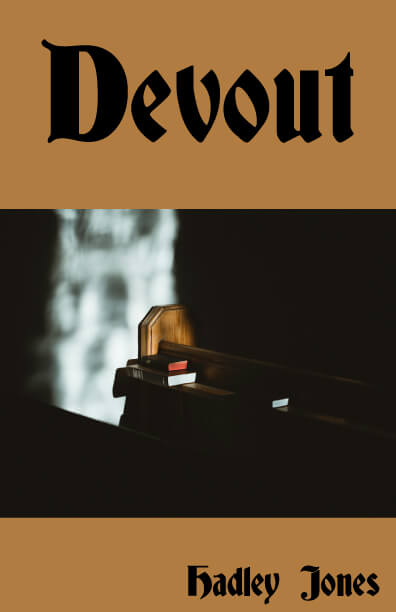Candice reviews Hadley Jones’ Devout, which is a fiercely honest collection of poems exploring faith, sexuality, and mental health, with raw power and unflinching honesty, exclusively for Different Truths.

There is a wicked cleverness to Devout by Hadley Jones. They are one of those poets who appear to have formulated the collection in their head and laid it out, all as if it were intended from the very beginning to be this exact book, with these exact words. I’m talking about intentional and purposeful writing, which is not an easy skill to harness. Hadley Jones writes purposefully and without a hint of apology.
Martyr, as the opening poem, has a precise and efficacious sucker punch. Whether straight-gay-whatever, most of us can relate to the idea of religion being a doctrine with rules and the consequences of not obeying those rules. In my case, as a lesbian, this resonated powerfully for its willingness to lay bare, the confines of being gay and in the church.
I love God more
than I love myself. I am
everything they want
until I dive from grace
for a girl whose laugh is sweeter
than the promised land,
Some may feel such experiences have been done to death and therefore need no rehashing. I would argue that such experiences being indelible, have long-arcing effects, not least on one’s identity and sense of acceptance. Often a lifelong impact can and does provoke suicide attempts, as in the case of Devout. Hadley Jones’s clever use of the title implies so much more, as they struggle within the judgmental confines of doctrine unwilling to accept their love for another biological female. This matters! Both from a feminist and pro-queer perspective, but even more in basic human terms. The price so many paid for something they were born as. This is a raw polemic without falling into blatant influencing, it’s subtle and ferally clever.
I am not afraid of death, simply
aware of its inevitability.
Inescapable yet unpredictable.
We are handed a lifespan
averaged out of a million deaths. (How to Bury Grief).
Would I have imagined this collection, centred around being devout, could be as feminist and ragingly liberating as it is? The clever way Hadley Jones addresses these urgent issues, which have all been gone over many times before, they bring nevertheless, a fresh, direct perspective even in their titles, poems within their right, like; The Boys Played Games while We Learned About Modesty, where there are killer lines that slay, and remain long after reading:
I cannot argue against the evidence
that every man is hunting, even the ones
who claim to be on my team.
I appreciate the layers of insight in these poems. Many times, people try to be too clever, or erudite, and they lose the reader. Devout is written thoughtfully, there’s a distinctive style of writing, that’s to the point and possible to relate to. The author’s directness, as if they were speaking to you, is like that of a confident. Eating disorders, sexism, impossible love, double standards for boys v. girls, there’s a world here, within the enclaves of faith-based education and church, and the author allows us to peer in without censorship. I haven’t read a book revealing the broken side of faith-based education in a long time, but there’s something even more in Devout. Here is a painful revealing that goes much further from the very mouth of the abused prostrate. It is that resonating ability to write brilliantly and fluently, alongside the ability to convey viscerally, your direct experience. The two don’t usually marry, but when they do, the immediacy and poignancy are both exquisite and disturbing:
Why won’t you listen?
What do I need to kill
to make you see me? (Gethsemane).
Absolute proof of electric writing is how many times you want to quote and share it. In the poem Bad Again, each line urges the reader closer to notions of completed suicide and its hideous reality:
I am counting the minutes with half my body tethered
to someone else’s will for me to live. Later,
a friend says, I’m so glad you’re here,
I’m so glad you asked for help.
I lie and say, Me too.
Done without abundant sentiment, almost perfunctory in laying out the events, there’s a distance in this, that allows the reader to draw closer, because it’s too much, but it’s necessary and evoked from the belly of the poem to purpose curiosity to its revealed end. And once examined, the horror exposing itself, line by line, allows you to step back and in your mind’s eye, envision what pains drove someone to that point, and how fickle the longing to stay alive, when the relief of death, beckons so addictively. I have not read many poems that manage in every stanza, to relay this kind of longing, with a quixotic universalism. The brutality of wanting to die, isn’t vanquished, it’s understood, in all its very human awareness that many of us can admit to recognising:
i will never be sick enough
to feel worthy of healing.
but one day, may i be
healed enough to know
i always was. (Every Ad on My Phone is for Eating Disorder Treatment).
I have read many collections about being in psych wards and suicide, and each one holds a valuable snapshot in time. There is an unvarnished depth to Hadley Jones’ Devout, from the title, that piques the question and the content, that undaunted, answers it. These are subjects we should be thinking about, it’s still happening. For all the acceptance and social media awareness, there is so much pathology in the mastication of institutionalised religion, that can destroy people. And mental illness is one of the loneliest roads to walk down, regardless of Apps promising to be your companion in healing. Devout isn’t anti-religious, it’s ripping the bandage from a festering wound of inadequacy, namely those in the church who harm more than help. It isn’t anti-therapist; it reveals the inadequacies of a for-profit system. Having worked in crisis care, and found it woefully lacking, this is also a polemic on the dearth of support networks that fail people who suffer from mental illness or scars and trauma from abusers or an alienated world.
The clothes in my closet belong
to the person I was before I got suicidal, (Exit).
We still don’t help people recover, so much as a penchant for judging and condemning them for getting sick. When the mind and body are so intertwined and unable to separate, why do we sympathize when someone has heart failure and persist in judging when it’s a mental breakdown? Our judgement is half the poison pushing people further toward the ledge. Poetry has always been a vehicle to describe this alienation and abandonment by society, and Hadley Jones follows powerfully in this tradition of very personal, courageous first-hand testimonies of survival.
Should I stop wearing my seatbelt?
How many milligrams is too many to keep down?
Will anyone speak at my funeral? (Exit).
It would be trite to compare her to Sexton, or Plath, as this too, has been overdone. Equally, biological-female confessional poetry is a long tradition, historically underappreciated or understood in only shallow terms. Yet it remains without a shadow of a doubt, the purest form of testimonial and truth of female suffering, that when added together, forms a necessary sustaining wall of feminism. And as with any sustaining wall, it must be reinforced regularly to remain in our consciousness and our blood.
how am i supposed to heal
a wound opened
by a healer? (What I Should’ve Told My Counselor in our Last Session).
Hadley Jones may be the next to inherit this responsibility of educating future generations on the necessity of seeing things as they are, and not through inaccurate labels and stereotypes. We can outgrow our taught prejudices, but only if someone is brave enough to remind us of what they are. Ultimately, we must know these things exist. We must not turn away. For every good person in religious organisations, there exist predators and deniers, who do irreparable harm. And why this matters in a religious context is abundantly clear; we put our faith in the representatives of God, nearly as much as in God, if we believe. And those representatives have the power therefore to condemn us or infiltrate shame in varying degrees of madness. Most of us are aware of the church’s history of double standards; do as I say, not as I do. And of the contrast in modern times, of writing off sexual abuse survivors, even those who become pregnant by rape. An antiquated form of dealing with the realities of life, it’s also deeply damaging to those who still endure such treatment(s) all in the name of a saviour? It smacks of hypocrisy that must finally be vanquished, and that is revealed in every poem about the subject:
I forgive myself for living
long enough to get here. (I Forgive the Scars for Healing).
Beyond surviving castigation by doctrine, Hadley Jones ultimately survives to write this, their second book, where they expose the flaws in the systems, alongside a strange hopefulness. Yes, you heard that right. Upon finishing Devout I felt hopeful. Angry too. Obviously. Angry at what I’d been reminded of, and how things should have changed by now and really haven’t near enough. But hopeful. Of Hadley’s strength to speak about their experience and add to the swelling number of people who have decided, it’s not too late to force change, and it only happens when we continue to speak out. Devout is a social justice roar. It envelops you in its fight, and then asks you; will you join us?
Cover image sourced by the reviewer






 By
By

 By
By
 By
By